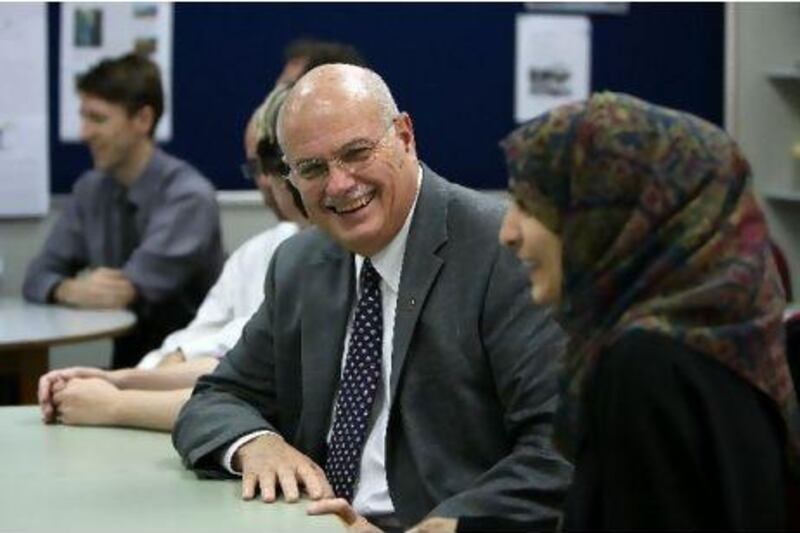RAS AL KHAIMAH // Of the 18 campuses that make up the Higher Colleges of Technology, none have a better record so far for Emiratisation than the RAK campuses.
Twenty four per cent of its staff are Emirati, including six per cent of its teachers and half its administrative staff.
Dr Bob Moulton, the colleges' director, puts that down to RAK's high Emirati population, as well as a lack of other employment opportunities in the emirate.
"The proportion of Emiratis in the workforce should mirror the proportion of Emiratis in the population," he said. "Our short-term target should be 30 per cent, and long-term we should reach 40 to 50 per cent."
Each college is given a budget from a Dh10m central fund each year, to recruit more local staff, and the college's graduates are often first choice.
"Each year, each director is given funds to hire four Emiratis," explained Dr Moulton. That will cover the recruit's salary for the first year; after that, the college has to work out how to include the Emiratis' higher salaries in their general budget.
Emirati staff are vital, he said, especially in roles such as counsellors and teachers, roles that need to command the students' respect.
"HCT is 24 years old and we have enough people coming through the system now that we should have more Emiratis teaching and in administration, and soon as directors. We don't yet have any Emirati directors, but that time is coming."
Shamma al Naqbi, 26, teaches in the college's education department. Teaching the country's future teachers, she feels she is a role model for her students.
"The students need to understand that one day they should be here, they should be responsible for the education of the youth," she said. "When the expats leave, we need to have our own qualified teachers so there won't ever be a sudden gap."
Saeed abu al Reesh is a counsellor at the men's college. "As an Emirati, there is a lot more trust," he said. "Knowing the language and culture is important, especially in RAK where many of our students are from quite remote, traditional bedouin villages."
Many expatriate teachers use the Emirati staff as a go-to source of advice on teaching materials and lesson plans, said Ms al Naqbi.
"The students also feel they can come to me with their problems, even if it's a problem with another teacher," she said. "I can intervene and help in situations, helping to build relationships."
In Fujairah's colleges, about 15 per cent - around 27 employees - are Emirati.
"We have one Emirati who teaches for us and I think two who are at the G6 early management level," said Dr Dave Pelham, the colleges' director. "We are currently working with all of our national staff on career plans, so that they understand what will be expected of them if they wish to move up in the organisation."
He admits the process of Emiratisation has not always been smooth. "The funding for the project has been inconsistent," he said. "Also, there has been a bit of a focus on hiring people in as faculty or at the G6 level. In our area it is difficult to find people with the credentials and experience to be considered for these positions.
"What we need is support, financial primarily, for hiring people at lower levels and then developing them.
"At our colleges we have been able to hire some of our best graduates but they still are not ready to go into the classroom or assume management responsibilities because they lack advanced degrees or experience."
He says key to success Emiratisation will be help with developing the capable, dedicated people they hire.
Dr Howard Reed, director of Dubai Women's College, which has trained several Emirati teachers, said Emiratisation has its challenges in Dubai too, where more employment opportunities means more competition for talented young nationals.
"The UAE is a young country and it takes time to develop a cadre of well-educated and experienced Emiratis in certain areas such as college and university teachers and senior managers," he said.
"In a business-minded community like Dubai it also is difficult to get young people to want to be educators and to accept the salaries offered in education."






